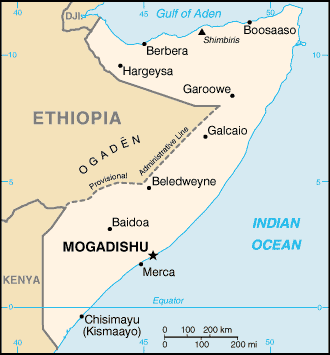Somalia
Map Courtesy CIA World Factbook
Intermittent civil war has been a fact of life in Somalia since 1977. In 1991, the northern portion of the country declared its independence as Somaliland; although de facto independent and relatively stable compared to the tumultuous south, it has not been recognized by any foreign government. Beginning in 1993, a two-year UN humanitarian effort (primarily in the south) was able to alleviate famine conditions, but the UN withdrew in Operation United Shield by March 3, 1995, having suffered significant casualties, order had still not been restored. Yet again another secession from Somalia took place in the northeastern region. The self-proclaimed state took the name Puntland after declaring "temporary" independence in 1998, with the intention that it would participate in any Somali reconciliation to form a new central government. A third seccession occurred in 1998 with the declaration of the state of Jubaland. The territory of Jubaland is now encompassed by the state of Southwestern Somalia and its status is unclear. A fourth self-proclaimed entity led by the Rahanweyn Resistance Army (RRA) was set up in 1999, along the lines of the Puntland. That "temporary" secession was reasserted in 2002. This led to the autonomy of Southwestern Somalia. The RRA had originally set up an autonomous administration over the Bay and Bakool regions of south and central Somalia in 1999. On December 26, 2004, one of the deadliest natural disasters in modern history, the Indian Ocean earthquake, struck off the western coast of Sumatra. The earthquake and subsequent tsunamis reportedly killed over 220,000 people around the rim of the Indian Ocean. Somalia was one of the many countries devastated by the resulting tsunami which struck the Indian Ocean coast, destroying entire villages and killing an estimated 300 people.
|
|||||||||||||||

 Somalia, formerly known as the Somali Democratic Republic, is a coastal nation in East Africa. Continentally, it is entirely surrounded by Ethiopia and Djibouti on the north and mid-west, and Kenya on its south-west; with the Gulf of Aden on its east. It currently exists solely in a de jure capacity, which can be described as anarchy. Somalia has no recognized central government authority, no national currency, nor any other feature remotely associated with an established nation state. However, much of Somali society is highly organized, businesses are functioning (some sectors doing remarkably well), and is home to several private universities. De facto authority resides in the hands of the governments for the unrecognized entities of Somaliland, Puntland, and other small rival warlords.
Somalia, formerly known as the Somali Democratic Republic, is a coastal nation in East Africa. Continentally, it is entirely surrounded by Ethiopia and Djibouti on the north and mid-west, and Kenya on its south-west; with the Gulf of Aden on its east. It currently exists solely in a de jure capacity, which can be described as anarchy. Somalia has no recognized central government authority, no national currency, nor any other feature remotely associated with an established nation state. However, much of Somali society is highly organized, businesses are functioning (some sectors doing remarkably well), and is home to several private universities. De facto authority resides in the hands of the governments for the unrecognized entities of Somaliland, Puntland, and other small rival warlords.